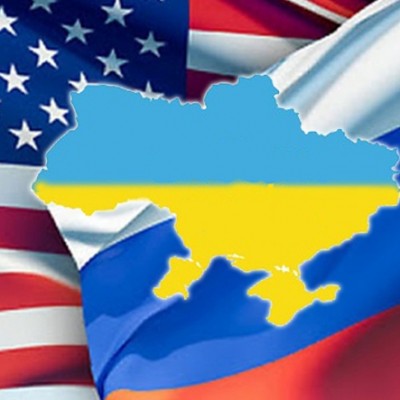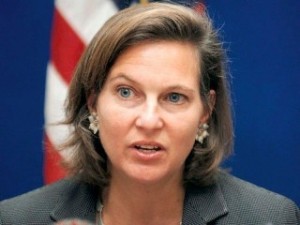High Cost of Bad Journalism on Ukraine

On Monday, a typically slanted New York Times article justified these modernization plans by describing “Russia on the warpath” and adding: “Congress has expressed less interest in atomic reductions than looking tough in Washington’s escalating confrontation with Moscow.”
But the Ukraine crisis has been a textbook case of the U.S. mainstream media misreporting the facts of a foreign confrontation and then misinterpreting the meaning of the events, a classic case of “garbage in, garbage out.” The core of the false mainstream narrative is that Russian President Vladimir Putin instigated the crisis as an excuse to reclaim territory for the Russian Empire.
While that interpretation of events has been the cornerstone of Official Washington’s “group think,” the reality always was that Putin favored maintaining the status quo in Ukraine. He had no plans to “invade” Ukraine and was satisfied with the elected government of President Viktor Yanukovych. Indeed, when the crisis heated up last February, Putin was distracted by the Sochi Winter Olympics.
Rather than Putin’s “warmongering” – as the Times said in the lead-in to another Monday article – the evidence is clear that it was the United States and the European Union that initiated this confrontation in a bid to pull Ukraine out of Russia’s sphere of influence and into the West’s orbit.

Image: Assistant Secretary of State for European Affairs Victoria Nuland, who pushed for the Ukraine coup and helped pick the post-coup leaders.
This was a scheme long in the making, but the immediate framework for the crisis took shape a year ago when influential U.S. neocons set their sights on Ukraine and Putin after Putin helped defuse a crisis in Syria by persuading President Barack Obama to set aside plans to bomb Syrian government targets over a disputed Sarin gas attack and instead accept Syria’s willingness to surrender its entire chemical weapons arsenal.
But the neocons and their “liberal interventionist” allies had their hearts set on another “shock and awe” campaign with the goal of precipitating another “regime change” against a Middle East government disfavored by Israel. Putin also worked with Obama to resolve the dispute over Iran’s nuclear program, averting another neocon dream to “bomb, bomb, bomb Iran.”
The Despised Putin
So, Putin suddenly rose to the top of the neocons’ “enemies list” and some prominent neocons quickly detected his vulnerability in Ukraine, a historical route for western invasions of Russia and the scene of extraordinarily bloody fighting during World War II.
National Endowment for Democracy president Carl Gershman, one of the top neocon paymasters spreading around $100 million a year in U.S. taxpayers’ money, declared in late September 2013 that Ukraine represented “the biggest prize” but beyond that was an opportunity to put Putin “on the losing end not just in the near abroad but within Russia itself.”
The context for Gershman’s excitement was a European Union offer of an association agreement to Ukraine’s elected President Viktor Yanukovych, but it came with some nasty strings attached, an austerity plan demanded by the International Monetary Fund that would have made the hard lives of the average Ukrainian even harder.
That prompted Yanukovych to seek a better deal from Putin who offered $15 billion in aid without the IMF’s harsh terms. Yet, once Yanukovych rebuffed the EU plan, his government was targeted by a destabilization campaign that involved scores of political and media projects funded by Gershman’s NED and other U.S. agencies.
Assistant Secretary of State for European Affairs Victoria Nuland, a neocon holdover who had been an adviser to Vice President Dick Cheney, reminded a group of Ukrainian business leaders that the United States had invested $5 billion in their “European aspirations.” Nuland, wife of prominent neocon Robert Kagan, also showed up at the Maidan square in Kiev passing out cookies to protesters.
The Maidan protests, reflecting western Ukraine’s desire for closer ties to Europe, also were cheered on by neocon Sen. John McCain, who appeared on a podium with leaders of the far-right Svoboda party under a banner honoring Nazi collaborator Stepan Bandera. A year earlier, the European Parliament had identified Svoboda as professing “racist, anti-Semitic and xenophobic views [that] go against the EU’s fundamental values and principles.”
Yet, militants from Svoboda and the even more extreme Right Sektor were emerging as the muscle of the Maidan protests, seizing government buildings and hurling firebombs at police. A well-known Ukrainian neo-Nazi leader, Andriy Parubiy, became the commandant of the Maidan’s “self-defense” forces.
Behind the scenes, Assistant Secretary Nuland was deciding who would take over the Ukrainian government once Yanukovych was ousted. In an intercepted phone call with U.S. Ambassador Geoffrey Pyatt, Nuland crossed off some potential leaders and announced that “Yats” – or Arseniy Yatsenyuk – was her guy.
The Coup
On Feb. 20, as the neo-Nazi militias stepped up their attacks on police, a mysterious sniper opened fire on both protesters and police killing scores and bringing the political crisis to a boil. The U.S. news media blamed Yanukovych for the killings though he denied giving such an order and some evidence pointed toward a provocation from the far-right extremists.
As Estonia’s Foreign Minister Urmas Paet said in another intercepted phone call with EU foreign affairs chief Catherine Asthon, “there is a stronger and stronger understanding that behind snipers it was not Yanukovych, it was somebody from the new coalition.”
But the sniper shootings led Yanukovych to agree on Feb. 21 to a deal guaranteed by three European countries – France, Germany and Poland – that he would surrender much of his power and move up elections so he could be voted out of office. He also assented to U.S. demands that he pull back his police.
That last move, however, prompted the neo-Nazi militias to overrun the presidential buildings on Feb. 22 and force Yanukovych’s officials to flee for their lives. Then, rather than seeking to enforce the Feb. 21 agreement, the U.S. State Department promptly declared the coup regime “legitimate” and blamed everything on Yanukovych and Putin.
Nuland’s choice, Yatsenyuk, was made prime minister and the neo-Nazis were rewarded for their crucial role by receiving several ministries, including national security headed by Parubiy. The parliament also voted to ban Russian as an official language (though that was later rescinded), and the IMF austerity demands were pushed through by Yatsenyuk. Not surprisingly, ethnic Russians in the south and east, the base of Yanukovych’s support, began resisting what they regarded as the illegitimate coup regime.
To blame this crisis on Putin simply ignores the facts and defies logic. To presume that Putin instigated the ouster of Yanukovych in some convoluted scheme to seize territory requires you to believe that Putin got the EU to make its reckless association offer, organized the mass protests at the Maidan, convinced neo-Nazis from western Ukraine to throw firebombs at police, and manipulated Gershman, Nuland and McCain to coordinate with the coup-makers – all while appearing to support Yanukovych’s idea for new elections within Ukraine’s constitutional structure.
Though such a crazy conspiracy theory would make people in tinfoil hats blush, this certainty is at the heart of what every “smart” person in Official Washington believes. If you dared to suggest that Putin was actually distracted by the Sochi Olympics last February, was caught off guard by the events in Ukraine, and reacted to a Western-inspired crisis on his border (including his acceptance of Crimea’s request to be readmitted to Russia), you would be immediately dismissed as “a stooge of Moscow.”
Such is how mindless “group think” works in Washington. All the people who matter jump on the bandwagon and smirk at anyone who questions how wise it is to be rolling downhill in some disastrous direction.
But the pols and pundits who appear on U.S. television spouting the conventional wisdom are always the winners in this scenario. They get to look tough, standing up to villains like Yanukovych and Putin and siding with the saintly Maidan protesters. The neo-Nazi brown shirts are whited out of the picture and any Ukrainian who objected to the U.S.-backed coup regime finds a black hat firmly glued on his or her head.
For the neocons, there are both financial and ideological benefits. By shattering the fragile alliance that had evolved between Putin and Obama over Syria and Iran, the neocons seized greater control over U.S. policies in the Middle East and revived the prospects for violent “regime change.”
On a more mundane level – by stirring up a new Cold War – the neocons generate more U.S. government money for military contractors who bestow a portion on Washington think tanks that provide cushy jobs for neocons when they are out of government.
The Losers
The worst losers are the people of Ukraine, most tragically the ethnic Russians in eastern Ukraine, thousands of whom have died from a combination of heavy artillery fire by the Ukrainian army on residential areas followed by street fighting led by brutal neo-Nazi militias who were incorporated into Kiev’s battle plans. [See Consortiumnews.com’s “Ukraine’s ‘Romantic’ Neo-Nazi Storm Troopers.”]
The devastation of eastern Ukraine, which has driven an estimated one million Ukrainians out of their homes, has left parts of this industrial region in ruins. Of course, in the U.S. media version, it’s all Putin’s fault for deceiving these ethnic Russians with “propaganda” about neo-Nazis and then inducing these deluded individuals to resist the “legitimate” authorities in Kiev.
Notably, America’s righteous “responsibility to protect” crowd, which demanded that Obama begin airstrikes in Syria a year ago, swallowed its moral whistles when it came to the U.S.-backed Kiev regime butchering ethnic Russians in eastern Ukraine (or for that matter, when Israeli forces slaughtered Palestinians in Gaza).
However, beyond the death and destruction in eastern Ukraine, the meddling by Nuland, Gershman and others has pushed all of Ukraine toward financial catastrophe. As “The Business Insider” reported on Sept. 21, “Ukraine Is on the Brink of Total Economic Collapse.”
Author Walter Kurtz wrote: “Those who have spent any time in Ukraine during the winter know how harsh the weather can get. And at these [current] valuations, hryvnia [Ukraine’s currency] isn’t going to buy much heating fuel from abroad. …
“Inflation rate is running above 14% and will spike sharply from here in the next few months if the currency weakness persists. Real wages are collapsing. … Finally, Ukraine’s fiscal situation is unraveling.”
In other words, the already suffering Ukrainians from the west, east and center of the country can expect to suffer a great deal more. They have been made expendable pawns in a geopolitical chess game played by neocon masters and serving interests far from Lviv, Donetsk and Kiev.
But other victims from these latest machinations by the U.S. political/media elite will include the American taxpayers who will be expected to foot the bill for the new Cold War launched in reaction to Putin’s imaginary scheme to instigate the Ukraine crisis so he could reclaim territory of the Russian Empire.
As nutty as that conspiracy theory is, it is now one of the key reasons why the American people have to spend $1 trillion to modernize the nation’s nuclear arsenal, rather than scaling back the thousands of U.S. atomic weapons to around 900, as had been planned.
Or as one supposed expert, Gary Samore at Harvard, explained to the New York Times: “The most fundamental game changer is Putin’s invasion of Ukraine. That has made any measure to reduce the stockpile unilaterally politically impossible.”
Thus, you can see how hyperbolic journalism and self-interested punditry can end up costing the American taxpayers vast sums of money and contributing to a more dangerous world.
No comments:
Post a Comment